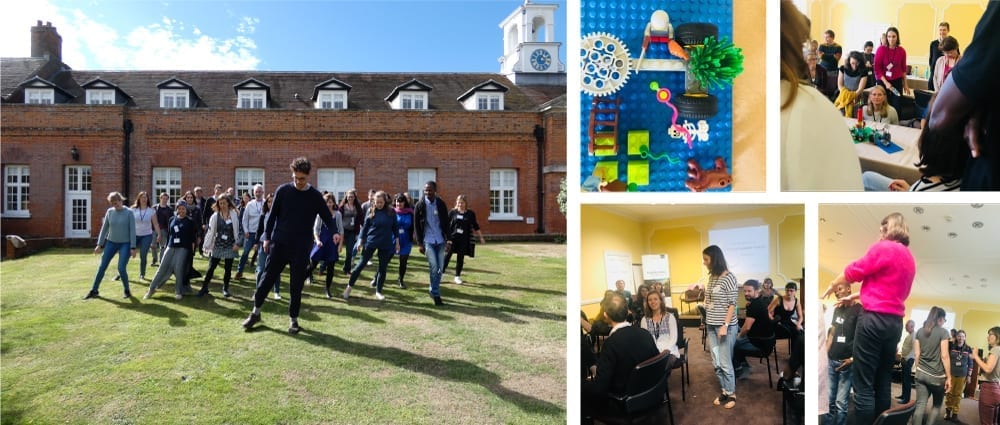Finding your place in the world of sustainable prosperity | CUSP Summer School 2018
Right before the calendar moved into autumn, we hosted our second CUSP summer school, bringing together young researchers for three days to share ideas, build friendships and have conversations that cut across (and sometimes challenge) the academic disciplines and experiences. In this short blog, Ellen Stenslie shares a few reflections.

This September, the second CUSP summer school brought together 24 PhD students with CUSP senior researchers at Cumberland Lodge. It was three wonderful days of creative activities and academic discussions set in inspirational and green surroundings near Windsor. These are my reflections, as a CUSP visiting PhD researcher from Norway doing research in the UK.
In my experience CUSP and its Summer School is unique in the way it brings together PhD students from such different disciplines. It all connects on some higher level, in that we all have a joint commitment to create positive change, under a range of topics from connections between leisure, wellbeing and senses of place to macroeconomic modelling of stranded assets, representing a highly conducive diversity. At the Lodge, PhD students had the opportunity to present their research to peers and mentors, and get useful feedback on how to move their research forward. There were also activities relating to the more practical aspects of doing a PhD, such as a beneficial PhDs only session to discuss shared challenges, as well a session in which Post-docs shared their experiences of life after the PhD (yes, there is one).
A common thread throughout the weekend was reflecting upon our research and our place in the world. During Lego serious play, we built ourselves as Lego characters, and subsequently Lego models in teams to articulate our collective visions of the sustainable society, wellbeing and the good life. Things went from the more abstract to the concrete while doing our best to keep within the line during line dancing, and the circle during Tai Chi. The workshop based on The Theatre of the Oppressed sounded daunting at first for the actor novices, but turned out to be both engaging and thought-provoking around power and empowerment.
Working with sustainable prosperity is in many ways more than just a job; it is a personal journey where one is forced to reflect upon life choices and what provides meaning and authenticity, both as a human being and as a young researcher. Summer schools like these are truly valuable in this regard, offering the opportunity to reflect critically upon shared visions and find inspiration for the continued efforts towards sustainable prosperity.
A PhD tends to focus researchers on narrow topics. In our #CUSPphd2018 working groups we aim to explore the inter- and tansdisciplinary breadth as well — exploring common themes and different ways of looking at the same topic: achieving lasting prosperity in a world of limits. pic.twitter.com/rbaPUS104p
— CUSP (@CUSP_uk) September 15, 2018
Arriving at shared visions of sustainable prosperity w #LegoSeriousPlay, merging individual models into one joint narrative. Very many thanks to @racheljstead for facilitating this lovely and hands-on creative workshop for us at #CUSPphd2018 #phdlife pic.twitter.com/aF6TFHBomU
— CUSP (@CUSP_uk) September 15, 2018
Exchanging informed views about the #GoodLife within limits at #CUSPphd2018 through #LegoSeriousPlay H/T @racheljstead pic.twitter.com/iS6MEuUiK3
— CUSP (@CUSP_uk) September 15, 2018
Thanks to @MalaikaEliza for introducing us to #ForumTheatre, and engaging us with the role that theatre (and oneself) can play in understanding power structures and in influencing political change #CUSPphd2018 pic.twitter.com/0sfPuFruMy
— CUSP (@CUSP_uk) September 16, 2018
An utterly fascinating workshop, allowing us to realise levers of change in power structure, influencing the narrative from within. #CUSPphd2018 pic.twitter.com/NMGG1Vf7Qm
— CUSP (@CUSP_uk) September 16, 2018
Great first day at the CUSP summer school slowly coming to an end. Special thanks go to @MarkLRB for sharing some of his collateral research insights into the sociality of line-dancing #phdlife #CUSPphd2018 pic.twitter.com/lQ85cJJlL0
— CUSP (@CUSP_uk) September 14, 2018
